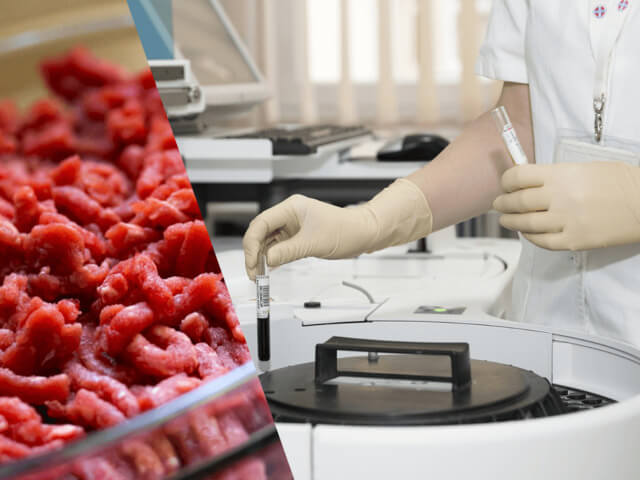In recent years, the debate over whether humans should consume meat has become more complex. While many people have abandoned meat-based foods due to nutritional and health concerns, others are more concerned about the environment and the long-term durability of their present lifestyles. Concerns about the fast-increasing rate at which humans consume meat have sparked a modern discussion over plant-based diets and the need for new approaches to help safeguard the ecosystem in the long run. Why More Meat Sources Are Needed?According to Statista, the global consumption of meat has more than doubled between 1990 and 2020. It suggests that humans have been farming and slaughtering more animals than ever before, endangering the ecosystem as well as the animals themselves. The substantial rise in meat demand has led to increased deforestation and greenhouse emissions worldwide, especially from beef, they claim. Scientists’ recommendation - Bio-engineered meat is one of those game-changing technologies that enables scientists to develop meat in laboratories instead of on farms, which is called lab-grown meat. What Is Lab-Grown Meat?Meat and dairy are the two main types of lab-grown food now in development. These are made either directly from animal cells or by fermentation with microbes. Besides lab-grown meat, the terms "cultured meat," "healthy meat," "in vitro meat," "vat-grown meat," "cell-based meat," "clean meat," "cultivated meat," and "synthetic meat" have been used to describe the product. Lab-grown meat is a meat produced by in vitro cell cultures of animal cells. It is a form of cellular agriculture that is grown from animal cells in a laboratory and is structurally identical to meat. While consumer interest in this replacement meat is spreading around the world, with individuals expressing enthusiasm about being able to enjoy meals guilt-free, many are concerned about whether it will be halal for Muslim consumers. Is Lab-Grown Meat Halal?Since the turn of the 21st century, there have been efforts to create organizations that certify food products as halal for Muslim consumers. Since 1991, some mainstream manufacturers of soups, grains, cosmetics, pharmaceuticals, prepared foods, and other products, as well as hotels, restaurants, airlines, hospitals, and other service providers have pursued the halal market. These companies purchase halal-certified products. This can allow companies to export products to most West Asian and Southeast Asian countries. Muslims have strict guidelines about meat preparation. The only foods explicitly forbidden are meat from animals that die of themselves, blood, or animals that eat meat, or skin like pigs or snakes. Only cud-chewing animals like cattle, deer, sheep, goats, and antelope are some examples of animals that are halal, and only if they are treated like living beings and slaughtered painlessly while reciting the Basmala. If the animal is treated poorly or tortured while being slaughtered, the meat is haram. The lack of a process for dhabiha creates all sorts of questions. For instance, can meat be halal if it’s grown in a lab and doesn’t come from a killed animal? Some Muslim scholars have been considering the consumption of lab-grown meat with the goal of reaching a more definitive conclusion in the future, but admit that the novelty, familiarity, and lack of details about manufacturing processes make determining whether it can be cleared for use by nearly 2 billion Muslims a difficult task. However, a number of Islamic law authorities have weighed in on the subject, offering advice on the conditions that can make lab-grown meat halal for Muslim consumption. If Islamic authorities rule that lab-grown meat is not halal, it will be forbidden to observant Muslims. Indonesia did just that. Cells obtained from living animals and cultivated in bioreactors fall "under the category of the carcass, which is legally unclean and forbidden to be consumed," according to a statement issued by Indonesia's leading Muslim organization, Nahdlatul Ulama, in September 2021. Last year, academics led by Islamic law expert Muhammad Taqi Usmani in Pakistan, the world's second-largest Muslim country after Indonesia, concluded that lab-grown meat is lawful only if the original cells came from animals slain in a Sharia-compliant manner. Many startups, on the other hand, rely on cell lines derived from living animals. Future Meat Technologies, an Israeli business, employs cell lines derived from ritually slain cattle, chickens, and lambs to address concerns about slaughter-free meat, according to its president. The company, which is seeking FDA certification, hopes to have its chicken in restaurants by early 2023 and expects to have overcome its theological difficulties by then. "We're on our way," the president said, adding that obtaining Islamic certification will not be difficult. He explains: "It'll be kosher as well as halal." Muslim experts in Singapore, though, whose government has been the world's fastest in allowing the marketing of lab-grown meat, are taking things slowly. In an emailed statement, the Islamic Religious Council of Singapore (IRCS) said, "Novel foods such as these are new areas in Islamic jurisprudence and require appropriate religious research, analysis, and interpretation. It is a new development, which IRCS is studying in detail." Companies Involved In Lab-Grown Meat IndustryAgribusiness behemoths aren't waiting for answers to such questions before entering the market, which is still in its infancy and, according to some estimates, might be worth $25 billion by 2030. According to Halal Times, Eat Just Inc., a San Francisco-based company that develops meat grown in bioreactors and is backed by billionaires Marc Benioff, Peter Thiel, and Facebook co-founder Eduardo Saverin, began selling lab-grown chicken nuggets in Singapore in 2020, and in December 2021, received permission to introduce cultured chicken breast there. The company is now targeting Muslim consumers. In August, it announced plans to build a facility in Qatar. However, it hasn’t received a seal of approval for its meat from the religious experts. Brazil’s JBS SA, the world’s top supplier of animal protein through brands including Swift and Primo, agreed on Nov. 18 to acquire Spanish cultured meat company BioTech Foods for $100 million. Archer-Daniels-Midland Co.’s investment arm, ADM Ventures, co-led a $347 million investment in Israeli startup Future Meat Technologies, the companies announced on Dec. 20. Cargill Inc. and Tyson Foods Inc., along with Bill Gates and Richard Branson, are investors in California-based lab-grown meat developer Upside Foods. Countries Involved In Lab-Grown Meat Production?Countries connected to developing this technology are Argentina, Australia, Canada, China, France, Hong Kong, India, Israel, Belgium, Japan, Netherlands, Singapore, Spain, Switzerland, Turkey, United Kingdom, and the United States. Each country has at least one company that is involved in funding and/or researching lab-grown meat. Red meat (beef, pork, kangaroo, etc.), fat, poultry, foie gras, sea food (shrimp, fish protein, salmon, tuna, etc.), pet food, and scaffolding are among the products being studied by the research firms. ConclusionIt is stated that lab-grown meat may have the potential to address substantial global problems relating to the environmental impact of meat production (increased deforestation, greenhouse emissions, etc.), animal welfare, food security, and human health. Interestingly, if you want to do research on these topics, for example, cow’s flatulence, the first I don’t know how many pages (10-12 pages) would talk about how cows are farting and burping and releasing 160 to 320 liters of methane per day, and that’s basically causing global warming, etc. But if you actually dig into all the data and research, you are going to find some really interesting things that counter this theory and give you some of the data that’s missing and never included when they’re talking about this topic. For instance, between 1990 and 2007, the global cattle and buffalo population increased by a factor of 125 million extra cows and buffalo, not to mention innumerable deer, antelope, moose, elk, caribou, etc., on this planet, and during that period of time there was zero increase in methane. But this kind of data is always omitted from the discussion. When you are trying to evaluate information, you really need to have all the data to come up with the right conclusion. There are many other things that are much bigger in contributing to more methane than cows. The applications of lab-grown meat have led to ethical, cultural, and economic discussions. Some people are concerned about food security from a variety of perspectives; How secure would food be if it was controlled by a few corporations? Is there a risk of long-term use of lab-grown foods? If authorities can’t regulate what we have now, how can we be sure that they can regulate and control what’s coming? No more guilt? No more pollution? Don’t you think:
Regarding the halal status of the lab-grown foods, religious scholars need to come to a decision before these products hit the commercially available market. Tell us in the comments:
Links:
1 Comment
Carlos Cunningham
12/1/2022 08:06:20
I am actually doing a research essay on meat alternatives and this article was the best i have read thus far. Awesome work.
Reply
Leave a Reply. |
Halal In Japan
|
|



 RSS Feed
RSS Feed





